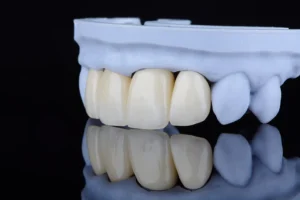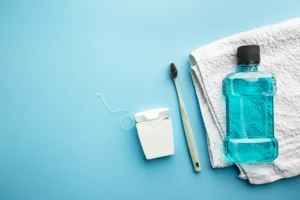Table of Contents
When several teeth are missing, eating and smiling can feel like a chore. This guide shares practical dentures tips—from fit and daily care to implant-retained options—so you can feel comfortable and confident. Billings West Dental provides custom complete and partial dentures designed to look natural and help you enjoy everyday life again.
This guide explains the types of dentures we offer, how the process works, what to expect during the first few weeks, and when dental implants can make dentures feel even more secure.
What Are Dentures?
Dentures are removable prosthetic teeth that replace multiple missing teeth. They restore your ability to chew and speak clearly while recreating a natural-looking smile. Depending on your needs, Dr. Low may recommend partial dentures or complete dentures, each custom-made to your mouth for a precise fit. For background on tooth replacement options and oral function, see the American Dental Association’s prevention resources and the Cleveland Clinic overview of dentures.
1) Partial vs. Complete Dentures: What’s the Difference?
Partial Dentures
- Best when you’re missing several teeth but still have healthy teeth remaining
- Fill the spaces between existing teeth to complete your smile
- Designed to be stable, comfortable, and easy to remove for cleaning
Complete Dentures
- Used when you’re missing all teeth on the top arch, bottom arch, or both
- A full denture restores chewing, speech, and facial support
- Traditional options are held in place by suction and dental adhesive; implant-retained dentures can add extra stability
At Billings West Dental, both options are custom-made so they match your natural tooth color and the contours of your gums for a comfortable, confident fit.
2) The Denture Process at Billings West Dental
Every smile is different. Here’s how Dr. Low personalizes your care:
Consultation and planning
We review your goals, evaluate your gums and remaining teeth (if any), and discuss whether a partial, complete, or implant-retained solution fits best.
Impressions and records
We take accurate impressions and bite measurements. These records go to a local dental lab that fabricates your denture to our specifications.
Try-ins and adjustments
Before the final denture is processed, we evaluate fit and appearance. Small refinements at this stage help your final result feel natural.
Delivery and fine-tuning
Once complete, your denture is fitted and polished. Expect a few follow-up adjustments as your mouth adapts—the fastest route to long-term comfort is fine-tuning early.
If extractions or implant placement are part of your plan, we’ll review timing and comfort options. For patients with anxiety, we offer conscious oral sedation: a prescribed medication taken in our office before treatment. You remain awake but deeply relaxed, and you’ll need a driver to and from the visit.
3) What to Expect in the First Few Weeks
- Practice makes comfortable: Reading aloud and chewing slowly on both sides helps you adapt.
- Sore spots are common at first: Quick adjustment visits relieve pressure points and improve comfort.
- Saliva changes and speech: Both normalize as you adjust. Small phonetic changes are typical and temporary.
- Diet progression: Start with soft foods and work up to a normal diet as comfort improves.
4) Care and Maintenance: Dentures Tips
- Clean daily: Brush dentures with a soft brush and non-abrasive cleanser. Avoid regular toothpaste, which can scratch surfaces.
- Soak overnight: Use a recommended soaking solution to keep them fresh and maintain shape.
- Clean your gums and tongue: A soft toothbrush or damp gauze removes plaque and stimulates tissue health.
- Handle with care: Clean over a folded towel or basin of water to prevent damage if dropped.
- Relines and repairs: Gums and bone can change over time. Professional reline or rebase services restore fit—don’t attempt at-home repairs or glues.
Routine exams let Dr. Low check fit, screen for oral conditions, and keep your mouth healthy long term.
5) When Dental Implants Make Dentures Even Better
If you’re seeking more stability, dental implants can anchor your denture for a secure, confident feel—especially on the lower arch, where traditional dentures can feel less stable. Benefits include:
- Less movement while chewing and speaking
- Improved comfort and confidence
- Potentially smaller, more open palate designs for upper dentures
- Better chewing efficiency compared to adhesive-only options
Implants can support either removable overdentures (snap-on) or fixed full-arch solutions. During your consultation, we’ll compare timelines, care, and costs so you can choose what fits your goals.
Who Is a Good Candidate for Dentures?
You may be a strong candidate if you:
- Are missing multiple teeth or an entire arch
- Want a cost-effective way to restore chewing and appearance
- Prefer a removable solution—or want to explore implant stabilization
- Are willing to commit to daily cleaning and periodic adjustments
If extractions are needed, we’ll discuss immediate dentures (placed the same day as tooth removal) versus conventional dentures (made after healing) and help you plan for comfort during the transition.
Frequently Asked Questions About Dentures
How long do dentures last?
With good care and periodic relines, many dentures last 5–7 years before replacement is recommended due to natural changes in gum and bone shape.
Will dentures change how I speak or eat?
There’s a short adjustment period. Reading aloud, practicing certain sounds, and starting with soft foods help you adapt quickly.
Can dentures be stabilized with implants?
Yes. Implant-retained dentures offer more stability and chewing comfort. We’ll evaluate bone levels and discuss how many implants are needed for your case.
How do I clean dentures?
Brush daily with a non-abrasive cleanser, rinse after meals, and soak overnight. Clean your gums and tongue, too.
How much do dentures cost?
Costs vary by type (partial vs. complete), materials, and whether implants are used. Traditional dentures are generally more budget-friendly, while implant-retained options cost more but increase stability.
Why Patients Choose Billings West Dental for Dentures
- Custom-made complete and partial dentures tailored to your smile
- Local dental lab craftsmanship for fit and esthetics
- Thoughtful adjustment visits for early comfort and long-term success
- Options for implant-retained dentures to increase stability
- Clear guidance, compassionate care, and a team that welcomes your questions
If you’re ready to restore comfort and confidence, Dr. Low and the team at Billings West Dental are here to help. Call our Billings, MT office to schedule a consultation and explore the best denture option for your smile.



